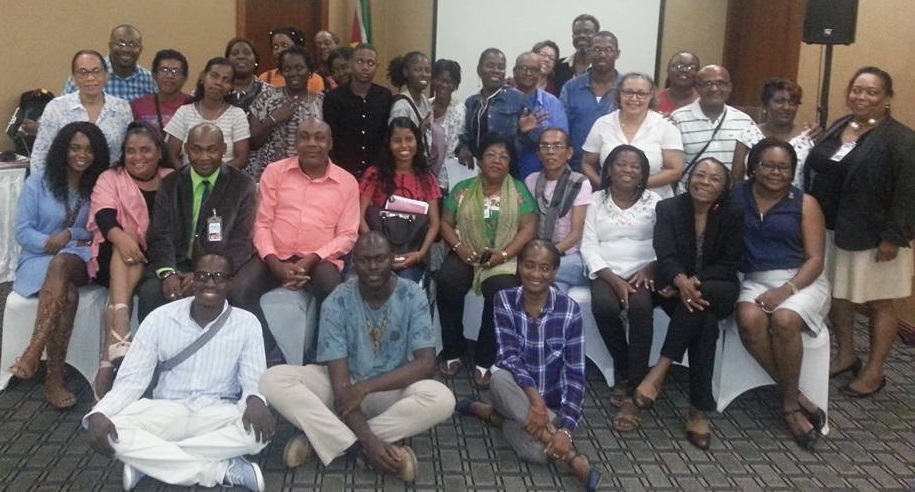
HIV education for persons with disabilities highlighted at CRN+ HIV Environmental Scan Dissemination MeetingInterim Chair calls for more innovation to ensure persons with disabilities are included in education efforts.
The Caribbean Regional Network of People Living with HIV and AIDS (CRN+), successfully completed a HIV Environmental Scan Dissemination Meeting in Paramaribo, Suriname on the 20th February. Participants included representatives from the “Double Positive Foundation”, HE+HIV Foundation, National AIDS Programme, Ministry of Health, Civil Society Organizations and CCM. The meeting was facilitated by Mr. Jason Shepherd, Senior Programme Officer, CRN+.
Pivotal to the discussion were calls from participants with disabilities on ways in which HIV prevention and care services can be designed to include them. These included creating HIV education materials with the use of Braille, the tactile writing and sign language systems used by people who are visually impaired. Other ideas included the use of a picture board or touch screen that uses pictures or symbols to communicate methods of HIV prevention and care.
CRN+ Interim Chair, Mr. Winfield Tannis-Abbot commended the involvement of persons with disabilities and stated that it was crucial for CSOs and National AIDS Programmes to provide HIV prevention and care services in a manner that is suited for this audience. “There is no excuse for the lack of access to knowledge on prevention and health care services”, stated the Interim Chair, “more innovation is needed to ensure that persons with disabilities can fully participate in our HIV prevention and care efforts”.
“Along with innovation, there needs to be a willingness from all parties to fully involve persons with disabilities in HIV prevention,” stated the CRN+ Senior Programme Officer.
The meeting formed part of a series of activities by CRN+ which included similar dissemination meetings and capacity building activities for CRN+ networks and CSOs in Belize, Dominican Republic, Haiti and Jamaica in January and February 2018.
WHAT IS PANCAP?
PANCAP is a Caribbean regional partnership of governments, regional civil society organisations, regional institutions and organisations, bilateral and multilateral agencies and contributing donor partners established on 14 February 2001. PANCAP provides a structured and unified approach to the Caribbean’s response to the HIV epidemic, and coordinates the response through the Caribbean Regional Strategic Framework on HIV and AIDS to maximise efficient use of resources and increase impact, mobilise resources and build the capacity of partners.
What are the Global AIDS Strategy 2021–2026 targets and commitments?
If targets and commitments in the strategy are achieved:
- The number of people who newly acquire HIV will decrease from 1.7 million in 2019 to less than 370 000 by 2025
- The number of people dying from AIDS-related illnesses will decrease from 690 000 in 2019 to less than 250 000 in 2025.
- The goal of eliminating new HIV infections among children will see the number of new HIV infections drop from 150,000 in 2019 to less than 22,000 in 2025.
What are the 95-95-95 Targets for ending AIDS?
- 95% of People Living with HIV know their HIV status;
- 95% of people who know their status on treatment; and
- 95% of people on treatment with suppressed viral loads.
HELPFUL LINKS:
Global AIDS Strategy 2021–2026, End Inequalities, End AIDS
https://pancap.org/pancap-documents/global-aids-strategy-2021-2026-end-inequalities-end-aids/
Caribbean Regional Strategic Framework on HIV and AIDS (CRSF) 2019-2025
https://pancap.org/pancap-documents/caribbean-regional-strategic-framework-2019-2025/
